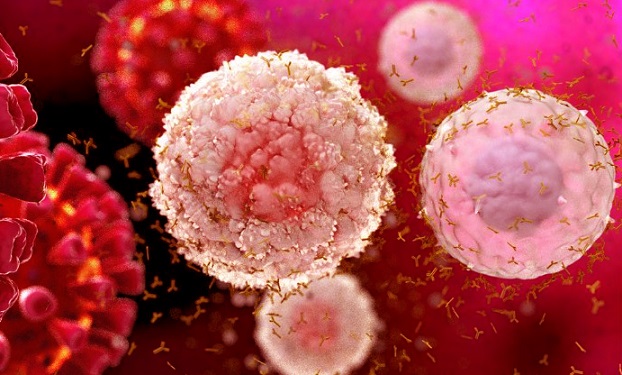Nikhil Prasad Fact checked by:Thailand Medical News Team Oct 05, 2025 4 months, 1 week, 1 day, 23 hours, 30 minutes ago
Medical News: How COVID-19 Weakens the Body’s Defense Forces
A new study has revealed how SARS-CoV-2, the virus behind COVID-19, disrupts the body’s immune system by damaging the functions of key immune cells. Using a sophisticated mathematical model, researchers examined how immune cells—especially natural killer (NK) cells and T cells—interact with inflammatory molecules known as cytokines. Their findings show that COVID-19 not only triggers dangerous “cytokine storms” but also cripples the body’s first line of defense, leading to prolonged inflammation and tissue damage.
 COVID-19 Causes Immune System Breakdown by Damaging Key Defense Cells
COVID-19 Causes Immune System Breakdown by Damaging Key Defense Cells
The study modeled how these immune cells behave during infection and how imbalances in cytokine production—particularly of interleukin-6 (IL-6), interferons, and tumor necrosis factor-alpha (TNF-α)—determine whether a person experiences mild or severe disease. According to this
Medical News report, the researchers simulated both mild and severe cases of infection to pinpoint which biological processes cause immune malfunction.
The study was conducted by scientists from the Department of Engineering and the Department of Mathematics and Statistics at Elon University, USA, along with Ayesh Awad from the Center for Gastrointestinal Biology and Disease at the University of North Carolina at Chapel Hill, USA, and Hwayeon Ryu from Elon University, USA.
Natural Killer Cells Lose Their Punch
Under normal conditions, natural killer (NK) cells swiftly destroy virus-infected cells before the infection spreads. However, in severe COVID-19, NK cells were found to lose much of their killing ability despite remaining present in large numbers. This dysfunction was closely tied to elevated IL-6 levels—a cytokine that, while meant to trigger inflammation, actually ends up suppressing NK cell activity.
The model demonstrated that when IL-6 becomes overactive, it blocks NK cells from recognizing and eliminating infected cells, allowing the virus to persist longer. This triggers other immune cells such as macrophages and neutrophils to overreact, releasing even more inflammatory cytokines and creating a vicious cycle of tissue damage and immune exhaustion.
A Cascade of Immune Chaos
The study’s simulations showed that in mild COVID-19, immune cells and cytokines rise briefly and then return to normal levels within ten days. But in severe disease, immune signals spiral out of control. IL-6, TNF-α, and GM-CSF surge to extremely high concentrations, keeping the body in a constant state of inflammation even after the virus has been cleared.
This continuous immune activation damages lung tissue, leading to respiratory distress and, in extreme cases, multi-organ failure. At the same time, interferon responses—which are critical for antiviral defense—become weak and delayed, further tipping the balance t
oward chaos. T cells, another major weapon against viruses, were also found to decline sharply in severe cases, mirroring the “lymphopenia” often seen in hospitalized COVID-19 patients.
Key Insights for Future Treatments
By adjusting variables in their model, the researchers discovered that restoring normal interferon activity or suppressing excessive IL-6 and TNF-α levels could dramatically improve immune balance and reduce disease severity. Their findings also explain why drugs targeting IL-6, like tocilizumab, or anti-inflammatory treatments such as corticosteroids can help but only when used at precise stages of infection.
The study provides a powerful framework for predicting how different therapies might impact immune recovery. It also highlights that severe COVID-19 is not just a problem of viral replication—it is an immune system breakdown caused by cytokine-driven dysfunction of critical immune cells.
These insights open the door to better strategies for managing severe infections and preventing long-term immune exhaustion in survivors. Understanding how the virus sabotages immune cells like NK and T cells could also help in designing future vaccines or antiviral drugs that restore immune coordination rather than merely blocking the virus.
The study findings were published on a preprint server and are currently being peer reviewed.
https://www.biorxiv.org/content/10.1101/2025.10.03.680253v1
For the latest COVID-19 News, keep on logging to Thailand
Medical News.
Read Also:
https://www.thailandmedical.news/news/covid-19-infection-causes-major-damage-to-t-cells
https://www.thailandmedical.news/news/persistent-immune-chaos-lingers-one-year-after-covid-19-infection-and-fuels-long-covid-and-lung-damage
https://www.thailandmedical.news/news/groundbreaking-study-offers-insight-into-the-long-term-immune-effects-of-covid-19
